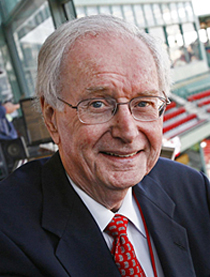
Culture
He didn't just cover baseball; he wrote on all kinds of sports -- football, boxing, horse racing, even fishing -- not so much on basketball, though, which he didn't like very much.

Flavin
How are you getting your baseball fix these days? There are great games being replayed on NESN and MLB-TV -- and replayed, and replayed, over and over again. I stopped watching them back in April sometime. I know them all by heart at this point. Roberts is going to barely beat Jeter's tag. Torii Hunter is going to go head first into the bullpen, trying to grab Big Papi's grand slam. The ball is going through Buckner's legs -- every damn time that game is on. And I don't care what happened in a game five years ago between the Mets and the Royals.
I've had to look elsewhere to feed my baseball habit -- and I'm pleased to announce that I have found the answer. My baseball needs are being met these days by a writer whose insights, analyses, and lively prose are enough to satisfy the appetite of any baseball aficionado.
And he's been dead for 38 years.
Walter "Red" Smith, who died in 1982, was a sports columnist for The New York Times and, before that, The New York Herald Tribune, for a total of almost 40 years. He was syndicated in more than 250 newspapers, which meant that he also wrote for a paper near you. He didn't just cover baseball; he wrote on all kinds of sports -- football, boxing, horse racing, even fishing -- not so much on basketball, though, which he didn't like very much. It was baseball, however, for which he had the most enthusiasm, and about which he wrote most often.
He is considered to be the Babe Ruth of sports writers, which is to say the greatest of all time.
A collection of some 200 of his columns on the game, called "Red Smith on Baseball," was first published 20 years ago and is still available. If you like baseball, and if you like good, imaginative writing, get yourself a copy -- you won't be disappointed.
He was witty, inventive, and passionate. Just as important, he was on the scene; his dispatches were not from a newspaper office, or some ivory tower somewhere, but from the press box. He made it his business to be at the events he wrote about, a holdover, no doubt, from his early days as a baseball beat writer, covering the Philadelphia Phillies and Athletics. And he made you feel like you were there, too.
A piece he wrote way back in 1947, for example, about the release of a pitcher named Hugh Mulcahy by the lowly Pittsburgh Pirates seems as up to date as today as it did when first written 73 years ago. It's the human story of a pitcher's career reaching the end of the line. In this case, Mulcahy -- who, it turns out, was born in the far off and exotic village of Brighton, Massachusetts -- was the first ballplayer called to military duty after the draft came into existence prior to World War II, so he missed four full seasons. When he returned, his best years were behind him. He had played before the war for bad teams, twice leading the league with 20 and then 22 losses. His nickname, Smith points out, was "Losing Pitcher" Mulcahy. Both the player and the writer are long since dead, but Smith's prose brings them very much to life, even all these years later.
He was not without his opinions. For example, late in his career, he raged against what he called the "loathsome" designated hitter rule. One wonders if, had he still been around in Big Papi's heyday, he would be quite so outspoken about it now.
Several weeks ago, this space was filled with the tale of the seventh game of the 1946 World Series and how its outcome hinged, not on the big-name stars on the opposing sides, Ted Williams and Stan Musial, but on Dom DiMaggio and Enos Slaughter. One of the columns in Smith's book is dated October 15, 1946, the morning of that game. It is almost clairvoyant in its advice to readers to keep an eye on DiMaggio and Slaughter in the game to be played that afternoon.
He wasn't always right in what he wrote. He came down hard on Muhammad Ali for refusing induction into the military during the Vietnam War, calling him a showboater and a draft-dodger. But when it became apparent that Ali had acted out of principle, even though it cost him his heavyweight title and millions of dollars in income, Smith publicly recanted, saying in print that Ali was a great champion and a great man.
As is the case with so many great writers, Red (he detested his given name and always used his nickname in his byline) was often quoted by others. One frequently cited observation of his is, "Ninety feet between home and first base may be the closest that man has ever come to perfection." It's crisp, to the point, and the more you think about it, the truer it is.
College professors often used his columns to teach clear, concise writing. In 1976, he was awarded the Pulitzer Prize for commentary. Imagine that, a lowly sportswriter being chosen over all those thumb-twiddling deep thinkers who tell us what they think we should think about world affairs and the human condition.
He accomplished everything that he did while writing, usually against deadline, from his seat in the press box, or at ringside, or wherever the contest of the moment was being waged, and he managed to be both literate and entertaining. The amazing thing is that he made it all look so effortless -- which, of course it wasn't. As he famously observed, "Writing is easy. Just sit in front of a typewriter, open a vein, and bleed it out drip by drip."
In 1981, the Associated Press sports editors established an award to be presented annually to a writer or editor for "outstanding contributions to sports journalism." Who better to choose as the award's first recipient than Red Smith? And what better name to give the award than the Red Smith Award?
You know you have to be pretty good when they give you an award that's named after you.
- Dick Flavin is a New York Times bestselling author; the Boston Red Sox "Poet Laureate" and The Pilot's recently minted Sports' columnist.
Recent articles in the Culture & Events section
-
'Dignitas' and the mediaRussell Shaw
-
Scripture Reflection for April 14, 2024, Third Sunday of EasterDeacon Greg Kandra
-
St. Helena's House is established in the South EndThomas Lester
-
Is this synodality?Russell Shaw
-
Poking the hornet's nest of IVFFather Tadeusz Pacholczyk


















